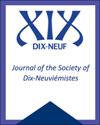The Romantic Basis of a Poetic Ecology in Nerval’s ‘Vers dorés’
IF 0.3
4区 社会学
0 HUMANITIES, MULTIDISCIPLINARY
引用次数: 0
Abstract
ABSTRACT This article aims to follow in the footsteps of French ecocriticism, while creating a double shift in its point of view: firstly, by questioning the work of the romantic writer Gérard de Nerval, who has never truly been studied through the prism of ecopoetry. Secondly, by proposing a resolutely transdisciplinary analysis at the crossroads of literature and philosophy. This study highlights the modernity of Nerval’s metaphysical conceptions of Nature but also how the poem ‘Vers dorés’ may become the manifesto of a poetic ecology through its performativity and its mobilisation of the figure of ruin.纳瓦尔的《幻境》中诗意生态的浪漫基础
摘要本文旨在追随法国生态批评的脚步,同时在其观点上进行双重转变:首先,通过质疑浪漫主义作家热拉尔·德·涅瓦尔的作品,他从未真正通过生态诗歌的棱镜进行过研究。其次,在文学和哲学的十字路口提出了一种坚定的跨学科分析。这项研究强调了Nerval形而上学的自然观的现代性,也强调了诗歌《Vers dorés》如何通过其表演性和对废墟形象的调动而成为诗歌生态的宣言。
本文章由计算机程序翻译,如有差异,请以英文原文为准。
求助全文
约1分钟内获得全文
求助全文

 求助内容:
求助内容: 应助结果提醒方式:
应助结果提醒方式:


